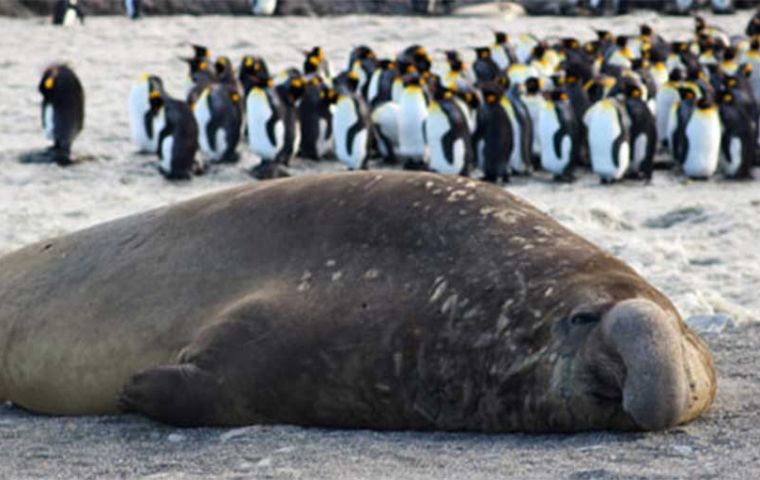MercoPress. South Atlantic News Agency
Bird flu expanding in Antarctica, high mortality among elephant seals
 Health experts say that even penguins are vulnerable to the bird-borne virus since they cluster together during the onset of the breeding season
Health experts say that even penguins are vulnerable to the bird-borne virus since they cluster together during the onset of the breeding season Mass elephant seal deaths have been reported in the Antarctic region after a high level of mortality has been detected among elephant seal pups at three sites around South Georgia. Animals have shown symptoms that are consistent with Highly Pathogenic Avian Influenza (HPAI), and the outbreak affects particularly the southern elephant seal species (Mirounga leonine).
In a media release on November 20, the British Antarctic Survey, BAS, acknowledged the first avian influenza case on Bird Island in October 2023, (on the brown scuba population) adding that the number of other HPAI cases in other animals had already been reported to the Government of South Georgia and South Sandwich Islands.
Laboratory tests of brown skua and kelp gulls swabs were conducted in the United Kingdom by the Animal and Plant Health Agency, which found that the specimens tested positive for HPAI H5N1. For health authorities that confirmed cases as far as 900 miles west of South Georgia, remains a mystery how the virus reached this remote part of the world.
Amid the presence of the bird flu virus in the Antarctic, (at least eight sites across the icy continent), the Scientific Committee on Antarctic Research, SCAR, recently stated HPAI is expected to cause dire repercussions on Antarctic wildlife and result to breeding failure and mortality events across the region.
Health experts say that even penguins are vulnerable to the bird-borne virus since they cluster together during the onset of the breeding season. In addition, previous reported outbreaks in Chile, Argentina, and South Africa also show their vulnerability to the disease.
Bird flu also called avian influenza, pertains to the disease caused by avian influenza Type A viruses, which natural spread among wild aquatic birds globally. The pathogen can also infect domestic poultry, as well as other bird and animal species, according to the Centers for Disease Control and Prevention (CDC).
Since the current global avian influenza outbreak, which started in 2021, it has been estimated that the bird flu virus killed millions of wild birds, including in the Americas, Europe, the UK, and South Africa. The most common bird flu symptoms are cough, sore throat, fever, and fatigue, the CDC said.
Before the bird flu outbreak in South Georgia and the Antarctic, the avian virus killed approximately 20,000 sea lions in South America, mainly in Chile and Peru. This week Uruguay also reported that some 2,300 fur seals and sea lions had been buried, of which al least 42% had testred positive to the bird flu virus. Most of the them were stranded dead along the Atlantic coast close to the Brazilian border.

Top Comments
Disclaimer & comment rulesCommenting for this story is now closed.
If you have a Facebook account, become a fan and comment on our Facebook Page!